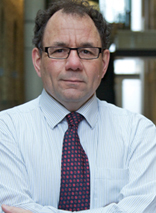What do tricky surgical procedures, an uneven walking gait, sloppy driving and museum exhibits all have in common? They might be getting help from the apps coming out of Professor Jonathan Rose’s Creative Applications for Mobile Devices graduate ECE course. At least, if the class’s showcase event held on April 3 and 10 was any indication.

The class is a novel idea, bringing together two engineering programmers and a non-programming content expert (an ‘apper,’ in Rose’s terminology) to create a unique application perfectly suited for smartphones.
“The idea is that the apper and programmers build an app that either furthers research in the apper’s discipline, or advances that discipline in some way,” Rose said. “The apper is vital, because he or she brings knowledge, insights and ideas from their field to the app.”
At this semester’s showcase, U of T graduate students, both from the Faculty of Applied Science & Engineering and from elsewhere within the University, demonstrated a variety of apps, including those that:
- could provide surgeons with a ‘one-stop-shop for surgery vital signs and videos, so procedures could be viewed, assessed and annotated conveniently from a single iPad screen;
- may help stroke victims and others deal with ‘step-time asymmetry,’ an uncomfortable imbalance in stride;
- could give users quick, custom workout programs geared to their age, gender and fitness level;
- might improve drivers’ road skills in real time via the motion detectors in a mobile phone;
- could help healthcare workers conduct clinical trials more effectively in the field; and,
- allow museum patrons to leave digital messages in response to open-ended augmented reality questions associated with museum exhibits.
Professor Rose hopes many of them will be refined and sent on their way to the Android Marketplace or the iTunes App store.
“I think that is a concrete outcome of the course, and several of the apps could well be directly useful to other people,” said Rose, who, clearly, has a positive app-titude.



